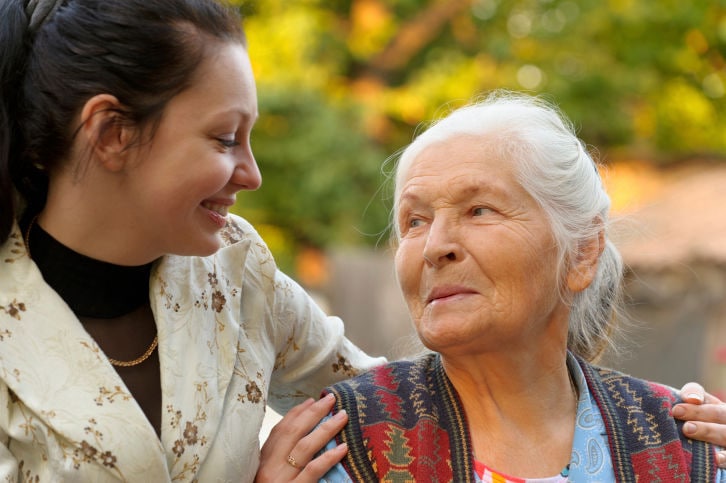Your children have come from school hungry for dinner, your husband is stuck at work, and your father keeps calling you because he can’t find his car keys–again. Many men and women in the UK feel these pressures today. Figures from the Office of National Statistics suggest that while the percentage of the UK population is growing older (UK census 2011), the median age of parents has been steadily rising (ONS, 2008).
Anyone Feel Guilty?
Not only are there emotional consequences arising from caring for an elderly parent, there are physical, organizational and financial issues as well. You might feel guilty about leaving the children at home with a babysitter to take your mother to a doctor’s appointment. Or, perhaps, you might feel guilty thinking about your dad sitting in the retirement home by himself while you’re on holiday in another city. Seems the combinations for creative ways to feel guilty are endless.
It’s hard to distance your needs from the endless needs of your parents which tend to focus on taking care of their finances, physical care, being their advocate with other carers, the GP and so on, and your children’s needs.
Try a pragmatic approach to being in the sandwich generation. Firstly, make time for yourself and as a couple. Stick to regular family get together when as a family you can all spend time together. As the logistical and financial pressures of the sandwich generation start to increase, don’t feel that you have to make this time an entertainment or other paid-for activity. Other suggestions to cope are:
- Use local social workers (through the social services and with the help of your parents GP if possible) assigned to your parents’ case to help alleviate some of the burden. It also means that the social services are obliged to keep track of any changes in needs and ill health.
- Make sure that your parents’ GP is aware of the situation. Older people who are finding it hard to cope are often very good at putting on a good show for others. Remember that sometimes their personal pride is at stake here.
- Help your parents to set up bills and banking set up as direct debits. Technology can also be useful for on-line shopping or staying in touch.
Have You Considered Hiring Professional Help?
As mentioned, for those who can afford it (or who have parents with suitable savings), hiring professional help for Mum or Dad can be a blessing for everyone involved. A friendly, safe, registered retirement home or hands-on care home may also be required. Currently, my Dad – who lives over 600 miles away in France — gets by with a regular cleaner, but knowing that someone is looking in on him two or three times a week is all we need for peace of mind at the moment.
My own grandmother was able to live in a good, local care home for the last few years of her life. She had her own one-bedroom space, made new friends, ate in a lovely dining room with nutritional meals and received the healthcare assistance she needed on a daily basis. Bear in mind, however, that the obstacles and solutions will be different for everyone.
When Granny Wants to Stay In Her Own Home
Of course, my Grandma, as well as many other older people, would have preferred to stay in her own house for a longer time. However, given the complexities of her situation (growing older and frailer with a special needs daughter still at home), her grown children and ultimately her GP, felt she would be safer, and happier, in a retirement home.
Dealing with parents who do not want to move or won’t admit that they have a physical or mental need for increased care can be trying for their frustrated grown children, especially those who have small children of their own. My own Mum dealt with the complaints of her parents-in-law when she and my stepdad insisted that they move out of their flat and into a retirement home. It was a long, emotional process but ultimately it has worked out very well.
Have You Considered Having Your Parent Move In With You?
Although it’s stressful trying to juggle small children and older parents, it can be wonderful for both parties to get involved with each other. If your ageing parents are living in your house, your children will have the opportunity to get to know their grandparents. This is a very special relationship which should be nurtured if at all possible. And, of course, it’s emotionally beneficial for the elderly to spend time with children–especially their own relatives.
My mother-in-law concurs. Her suggestion regarding ageing parents and small children “is to throw them together because they can benefit so much from each other.” Of course, if granny or grandpa live with you and enjoy their peace and quiet, they may feel overwhelmed with youngsters singing nursery rhymes at all hours or teens gossiping in the den with their friends. However, just like parents and their children, all families need to learn to work together.
The Chief Cook and Bottle-Washer In the Sandwich Generation
As the chief cook and bottle washer in the sandwich generation, you must manage your own needs, your partner’s needs, your children’s needs and your parents’ needs. It can be an exhausting combination but one that can also be rewarding and fruitful if you ask for the help which is now available more than ever on websites such as Care.com. Remember that you have to take some time out for yourself on a regular basis, even if it’s just a moment here and there — carers need to be taken care of too.
Carers UK is a wonderful resource that we at Care.com have enjoyed sharing thoughts and ideas with. They are great advocates for carers needing care too, and you can read more on their hints and tips to make this happen here.

